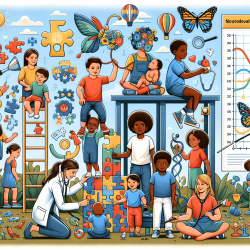Introduction
In the realm of speech-language pathology, making data-driven decisions is paramount to ensuring optimal outcomes for children. A recent study titled "Identifying Neurodevelopmental Disabilities from Nationalised Preschool Health Check" provides valuable insights that can significantly enhance the way practitioners identify and support children with neurodevelopmental disabilities (NDDs). By understanding and implementing the findings of this research, practitioners can improve their skills and make a profound impact on the lives of children and their families.
The Study and Its Findings
The study conducted in Aotearoa/New Zealand examined the effectiveness of combining multiple screening measures to improve the prediction of NDDs, such as attention deficit hyperactivity disorder (ADHD), autism spectrum disorder (ASD), and intellectual disability (ID), among preschool children. Utilizing a national cohort of 287,754 children, the research compared the predictive power of composite models with existing referral pathways.
The results were compelling. The best-performing composite model, which combined the Strengths and Difficulties Questionnaire (SDQ), the Parental Evaluation of Developmental Status (PEDS), vision screening, and biological sex, demonstrated 'excellent' predictive power with a C-statistic of 0.83. This was a significant improvement over the existing referral pathways, which had a 'poor' predictive power of 0.68. Moreover, the composite model improved the sensitivity of NDD diagnosis detection by 13% without any reduction in specificity.
Implications for Practitioners
For practitioners in speech-language pathology, these findings highlight the importance of adopting a holistic approach to screening and assessment. By incorporating multiple measures into a composite model, practitioners can more accurately identify children with NDDs and ensure they receive the necessary support and interventions during critical developmental periods.
Here are some practical steps practitioners can take to implement these findings:
- Embrace Composite Models: Incorporate composite models that combine psychometric and physical health screening measures into your practice. This approach has been shown to enhance the accuracy of identifying children with NDDs.
- Utilize Comprehensive Screening Tools: Leverage tools like the SDQ and PEDS, along with vision and hearing assessments, to gather a comprehensive understanding of a child's developmental status.
- Focus on Early Intervention: Early identification and intervention are crucial for optimizing outcomes for children with NDDs. Use the enhanced screening methods to identify children who may benefit from early support.
- Collaborate with Multidisciplinary Teams: Work closely with other professionals, such as psychologists, pediatricians, and educators, to ensure a coordinated approach to supporting children with NDDs.
Encouraging Further Research
While the study provides valuable insights, it also opens the door for further research. Practitioners are encouraged to explore the following areas:
- Validation of Composite Models: Conduct studies to validate the effectiveness of composite models in different populations and settings.
- Cross-Cultural Adaptation: Investigate the applicability of these models across diverse cultural and linguistic backgrounds to ensure inclusivity and equity in screening practices.
- Longitudinal Impact: Examine the long-term impact of early identification and intervention on the academic, social, and emotional outcomes of children with NDDs.
Conclusion
By embracing data-driven approaches and leveraging the power of composite models, practitioners in speech-language pathology can significantly enhance their ability to identify and support children with neurodevelopmental disabilities. This research underscores the importance of early intervention and comprehensive assessment, ultimately leading to better outcomes for children and their families.
To read the original research paper, please follow this link: Identifying neurodevelopmental disabilities from nationalised preschool health check.










